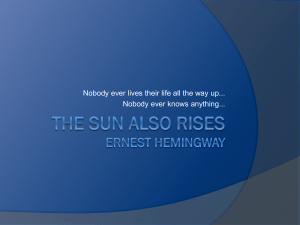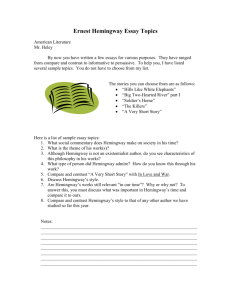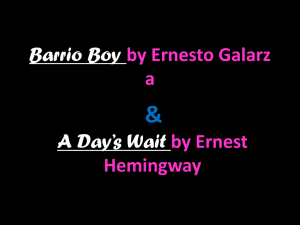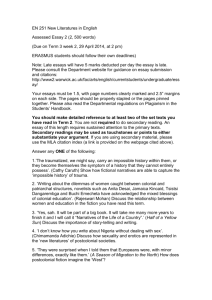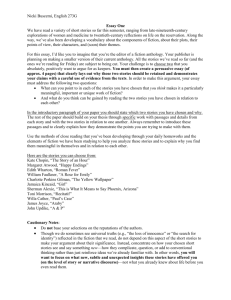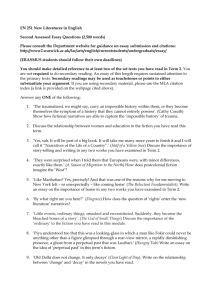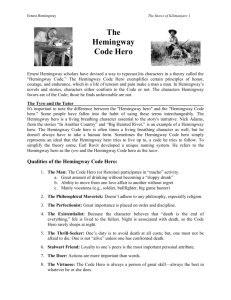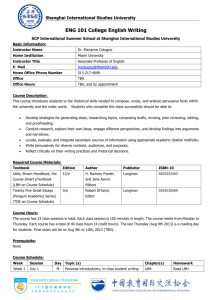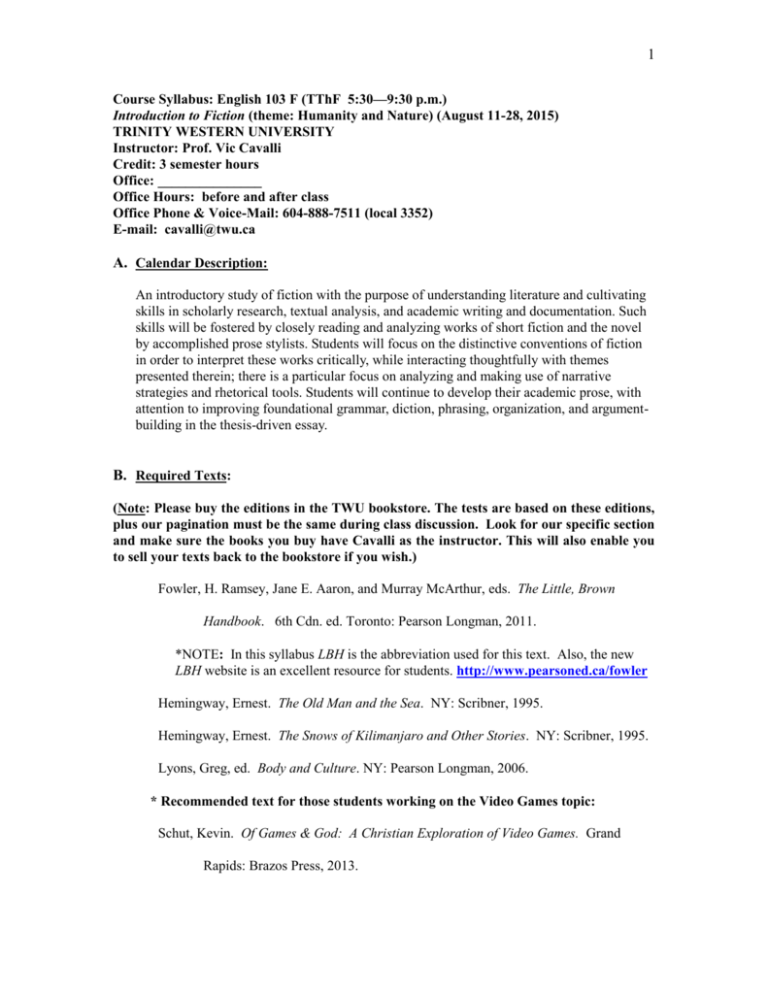
1
Course Syllabus: English 103 F (TThF 5:30—9:30 p.m.)
Introduction to Fiction (theme: Humanity and Nature) (August 11-28, 2015)
TRINITY WESTERN UNIVERSITY
Instructor: Prof. Vic Cavalli
Credit: 3 semester hours
Office: _______________
Office Hours: before and after class
Office Phone & Voice-Mail: 604-888-7511 (local 3352)
E-mail: cavalli@twu.ca
A. Calendar Description:
An introductory study of fiction with the purpose of understanding literature and cultivating
skills in scholarly research, textual analysis, and academic writing and documentation. Such
skills will be fostered by closely reading and analyzing works of short fiction and the novel
by accomplished prose stylists. Students will focus on the distinctive conventions of fiction
in order to interpret these works critically, while interacting thoughtfully with themes
presented therein; there is a particular focus on analyzing and making use of narrative
strategies and rhetorical tools. Students will continue to develop their academic prose, with
attention to improving foundational grammar, diction, phrasing, organization, and argumentbuilding in the thesis-driven essay.
B. Required Texts:
(Note: Please buy the editions in the TWU bookstore. The tests are based on these editions,
plus our pagination must be the same during class discussion. Look for our specific section
and make sure the books you buy have Cavalli as the instructor. This will also enable you
to sell your texts back to the bookstore if you wish.)
Fowler, H. Ramsey, Jane E. Aaron, and Murray McArthur, eds. The Little, Brown
Handbook. 6th Cdn. ed. Toronto: Pearson Longman, 2011.
*NOTE: In this syllabus LBH is the abbreviation used for this text. Also, the new
LBH website is an excellent resource for students. http://www.pearsoned.ca/fowler
Hemingway, Ernest. The Old Man and the Sea. NY: Scribner, 1995.
Hemingway, Ernest. The Snows of Kilimanjaro and Other Stories. NY: Scribner, 1995.
Lyons, Greg, ed. Body and Culture. NY: Pearson Longman, 2006.
* Recommended text for those students working on the Video Games topic:
Schut, Kevin. Of Games & God: A Christian Exploration of Video Games. Grand
Rapids: Brazos Press, 2013.
2
C. Course Requirements:
1. ATTENDANCE & TEST POLICIES: Students are not only responsible for
attending regularly and reading the assigned sections of the texts before the class dates
announced, but are also responsible for being “conscious” and attentive during class.
This requirement is essential if students are to be successful on the comprehensive final
exam. The detail required on the final exam can only be attained by students who attend
regularly, listen attentively, and take effective notes. ALSO, if you miss any of the
multiple-choice tests and you provide me with a doctor’s note (or other valid written
excuse), you won’t lose any marks, and you’ll be allowed to write a make-up test which
will be different from the one given in class. If you do not have a written documented
excuse for missing the test (not attending class), you will lose the marks. It is unjust that
any student should have more time to study than another student.
2. TECHNOLOGY ALLERT! LAP-TOP COMPUTERS are encouraged in class for
the purpose of taking notes during lectures and for conducting instructor-initiated courserelated research and writing exercises. HOWEVER, e-mailing friends, chatting, surfing
the web, etc., are highly distracting practices for you, your classmates, and the instructor.
Based on my 28 years of teaching experience, it is a statistical fact that students who
allow themselves to be distracted in this manner score the lowest grades in my courses,
typically earning between 55% to as low as 25% on their assignments! And so, out of
concern for your academic welfare, if you use your computer in this manner I will politely
ask you to please close it and shut it off. Also, during class please turn off your
PHONES, BLACKBERRIES, MUSIC, etc. The same low grade statistics apply to
students who are addicted to their phones and who persist in stealthily texting, etc., during
my lectures and then submit work which is either off topic or not even close to the
required formats, etc. I’m sorry, but I do not allow re-writes for low quality assignments
produced as a result of these distracted circumstances. Simple solution: don’t let
technology distract you.
3. Your Individual Group Work Responses ( 5%) [950-1000 words]: There will be
regular group work sessions where students will think critically and share their insights
with the class as a whole within the context of the Novel Study Questions, plus, the
specific Formalist method of analysis taught by the instructor. Students will come to
class prepared for discussion in their groups. Careful notes will be taken prior to and
during these sessions, and each student will submit an organized collection of responses
at term’s end. These will be labeled “My Individual Group Work Responses.” Your three
responses will be written in coherent, concise essay format, and using MLA format they
will contain carefully integrated quotations from the assigned texts. No point form notes,
please.
* You will type and revise into brief essay format your contributions to the in-class
novel presentations. As with your short fiction responses, here too use MLA format for
all quotations and page numbers, for example, Santiago claims, “A man can be destroyed
but not defeated” (103). Devote approximately 500 words in total to your novel study
question(s) responses.
* You will begin your short fiction responses with extremely concise comments on
purpose, point of view, and structure; then devote the remainder of your concise essays
3
(approx. 250 words each) to your contribution to the in-class short fiction presentations.
Carefully integrate quotations from your assigned texts, for example, “a brave man is
always frightened three times by a lion” (129).
Important: Do not integrate summarized ideas or direct quotations from secondary
sources into your responses; I’m only interested in your original thinking and
interpretations. Also, do not create one set of responses in each group and distribute
copies to each group member. Individually prepare, share in discussion, and develop
your own contributions to your group’s in-class presentations. Your individual group
work responses assignment—a typed, double-spaced, organized, dated, stapled
collection of three responses with a title page and MLA format works cited page—is due
at the beginning of the final exam on August 28, 2015.
Assigned Short Stories in The Snows of Kilimanjaro and Other Stories:
“The Short Happy Life of Francis Macomber” (pages 121-54)
“The Snows of Kilimanjaro” (pages 3-28)
4.
THE “COMPLETE PROCESS” RESEARCH ESSAY (1500 words, 25%):
You have two options for the research essay: (1) a contemporary issues
argument focus, or, (2) an interdisciplinary literature focus: see pages 5-9 in this
syllabus for the complete details of each option.
5.
There will be a comprehensive final examination (essay format answers); the topics
will be selected from all of the material and concepts discussed in class, both
composition and literature. Attend, be alert, and take good notes.
6.
The “complete process” research essay must be completed in order to pass the
course.
D. Evaluation & Important Test & Due Dates:
Little, Brown Handbook Test #1: Introduction plus Chapters 1—4: (Aug. 18)--------7.5%
Critical Thinking Unit: Body Modification (approximately 1200 words, due as soon as
possible, but no later than the final exam) ------------------------------------------------10%
Ernest Hemingway’s “The Short Happy Life of Francis Macomber” (multiple-choice
test at the very beginning of class on Aug. 20)------------------------------------------------ 5%
Ernest Hemingway’s The Old Man and the Sea (multiple-choice test at the very
beginning of class on Aug. 25)--------------------------------------------------------------------10%
Little, Brown Handbook Test #2: Chapters 35—38: (Aug. 27)-------------------------7.5%
4
“Complete Process” Research Paper: (approx. 1500 words, due by Sept. 18, 2015)
Step B (optional), plus Steps A, C, and D----------------------------------------12.5%
Step E (two final drafts)--------------------------------------------------------------12.5%
Your Individual Group Work Responses (950-1000 words, due at the beginning of the
final exam)--------------------------------------------------------------------------------------------5%
Comprehensive Final Examination (Aug. 28)--------------------------------------------30%
*What to study for the two Little, Brown Handbook tests:
Test #1: (7.5%) multiple-choice composition test (please bring a pencil):
This test will cover your LBH’s Introduction, plus Chapters 1, 2, 3, and 4. Concentrate
on the key concepts indicated by the headings, the terms in bold font, and the information in
highlighted boxes. Pay extra close attention to chapter 4, and in particular study the fallacies
defined and discussed therein.
Test #2: (7.5%) multiple-choice research test (please bring a pencil):
This test will cover the research chapters in your LBH: chapters 35, 36, 37, 38, plus the
research lectures and the research documents distributed to you. In your LBH, concentrate on the
key concepts indicated by the headings, the terms in bold font, and the information in highlighted
boxes. Pay close attention to sections 37a and 37b.
______________________________________________________________
E. The Basic Sequence of the Course:
Introduction to University Writing: Body Modification Critical Thinking Unit & Writing
about Literature
(August 11, 13, 14, 18):
Discussion of readings from Body and Culture text
Introduction to the Writing Process (LBH, Introduction plus Chapters 1—3)
Introduction to Persuasive Patterns of Organization (LBH, Chapter 4)
Introduction to Research Writing (LBH, Chapters 35—38, plus research writing lectures and
documents)
5
A Formalist Approach to Ernest Hemingway’s Short Fiction
(August 20, 21):
view Hemingway Biography Documentary, then
* Analysis of “assigned short stories” plus others (time permitting)
Assigned Short Stories in The Snows of Kilimanjaro and Other Stories:
“The Short Happy Life of Francis Macomber” (pages 121-54)
“The Snows of Kilimanjaro” (pages 3-28)
Introduction to the Novel (Ernest Hemingway):
* Nature symbolism
* The novel as a form
* Narrative structure, point of view, time, etc.
(Aug. 25):-------------Ernest Hemingway’s The Old Man and the Sea
(Aug. 27):-------------continued discussion of Ernest Hemingway’s The Old Man and the Sea;
plus, review of Research Writing
Comprehensive Final Examination (August 28: 5:30—8:30 p.m.)
As we work together this term may God be central to all of our thoughts and actions, and
may we pray for each other.

